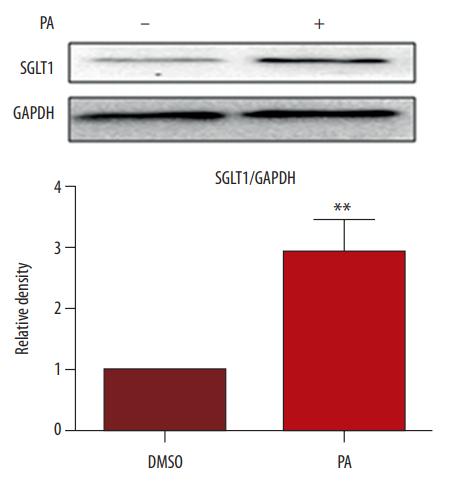SLC5A1 Antibody - #DF7202
| Product: | SLC5A1 Antibody |
| Catalog: | DF7202 |
| Description: | Rabbit polyclonal antibody to SLC5A1 |
| Application: | WB |
| Cited expt.: | WB |
| Reactivity: | Human, Mouse, Rat |
| Prediction: | Pig, Zebrafish, Bovine, Horse, Sheep, Rabbit, Dog, Chicken |
| Mol.Wt.: | 60kDa; 73kD(Calculated). |
| Uniprot: | P13866 |
| RRID: | AB_2839154 |
Related Downloads
Protocols
Product Info
*The optimal dilutions should be determined by the end user. For optimal experimental results, antibody reuse is not recommended.
*Tips:
WB: For western blot detection of denatured protein samples. IHC: For immunohistochemical detection of paraffin sections (IHC-p) or frozen sections (IHC-f) of tissue samples. IF/ICC: For immunofluorescence detection of cell samples. ELISA(peptide): For ELISA detection of antigenic peptide.
Cite Format: Affinity Biosciences Cat# DF7202, RRID:AB_2839154.
Fold/Unfold
D22S675; High affinity sodium glucose cotransporter 1; High affinity sodium glucose cotransporter; High affinity sodium-glucose cotransporter; Human Na+/glucose cotransporter 1; Na(+)/glucose cotransporter 1; Na+/glucose cotransporter 1; NAGT; SC5A1_HUMAN; SGLT 1; SGLT1; SLC5A1; Sodium glucose cotransporter 1; Sodium/glucose cotransporter 1; Solute carrier family 5 (sodium/glucose cotransporter) member 1; Solute carrier family 5 member 1;
Immunogens
A synthesized peptide derived from human SLC5A1, corresponding to a region within the internal amino acids.
- P13866 SC5A1_HUMAN:
- Protein BLAST With
- NCBI/
- ExPASy/
- Uniprot
MDSSTWSPKTTAVTRPVETHELIRNAADISIIVIYFVVVMAVGLWAMFSTNRGTVGGFFLAGRSMVWWPIGASLFASNIGSGHFVGLAGTGAASGIAIGGFEWNALVLVVVLGWLFVPIYIKAGVVTMPEYLRKRFGGQRIQVYLSLLSLLLYIFTKISADIFSGAIFINLALGLNLYLAIFLLLAITALYTITGGLAAVIYTDTLQTVIMLVGSLILTGFAFHEVGGYDAFMEKYMKAIPTIVSDGNTTFQEKCYTPRADSFHIFRDPLTGDLPWPGFIFGMSILTLWYWCTDQVIVQRCLSAKNMSHVKGGCILCGYLKLMPMFIMVMPGMISRILYTEKIACVVPSECEKYCGTKVGCTNIAYPTLVVELMPNGLRGLMLSVMLASLMSSLTSIFNSASTLFTMDIYAKVRKRASEKELMIAGRLFILVLIGISIAWVPIVQSAQSGQLFDYIQSITSYLGPPIAAVFLLAIFWKRVNEPGAFWGLILGLLIGISRMITEFAYGTGSCMEPSNCPTIICGVHYLYFAIILFAISFITIVVISLLTKPIPDVHLYRLCWSLRNSKEERIDLDAEEENIQEGPKETIEIETQVPEKKKGIFRRAYDLFCGLEQHGAPKMTEEEEKAMKMKMTDTSEKPLWRTVLNVNGIILVTVAVFCHAYFA
Predictions
Score>80(red) has high confidence and is suggested to be used for WB detection. *The prediction model is mainly based on the alignment of immunogen sequences, the results are for reference only, not as the basis of quality assurance.
High(score>80) Medium(80>score>50) Low(score<50) No confidence
Research Backgrounds
Actively transports glucose into cells by Na(+) cotransport with a Na(+) to glucose coupling ratio of 2:1. Efficient substrate transport in mammalian kidney is provided by the concerted action of a low affinity high capacity and a high affinity low capacity Na(+)/glucose cotransporter arranged in series along kidney proximal tubules.
N-glycosylation is not necessary for the cotransporter function.
Membrane>Multi-pass membrane protein.
Expressed mainly in intestine and kidney.
Belongs to the sodium:solute symporter (SSF) (TC 2.A.21) family.
Research Fields
· Organismal Systems > Digestive system > Carbohydrate digestion and absorption.
· Organismal Systems > Digestive system > Mineral absorption.
References
Application: WB Species: human Sample: HUVECs
Restrictive clause
Affinity Biosciences tests all products strictly. Citations are provided as a resource for additional applications that have not been validated by Affinity Biosciences. Please choose the appropriate format for each application and consult Materials and Methods sections for additional details about the use of any product in these publications.
For Research Use Only.
Not for use in diagnostic or therapeutic procedures. Not for resale. Not for distribution without written consent. Affinity Biosciences will not be held responsible for patent infringement or other violations that may occur with the use of our products. Affinity Biosciences, Affinity Biosciences Logo and all other trademarks are the property of Affinity Biosciences LTD.

